Digital organising in the Covid-19 era
The curtains for the Afrika Vuka Climate workshop were drawn with an interesting session on Digital Organizing. This session focused on how activists across the continent can mobilise and campaign effectively in the face of a global pandemic. The panelist, Joseph Ibrahim of the Coal Free Nigeria Campaign and Ibra Cassis of Save Bargny campaign in Senegal took the participants on a ride of their experiences in digital organizing.
For Joseph Ibrahim, he emphasized the importance of establishing the objective of the campaign and how it aligns with existing traditions, culture, religion, and laws of the people. He then stated that these identified objectives should be communicated to the target audience using the most compelling stories.
He advised activists to place a high premium on telling the truth while telling stories of frontline communities as this will be the basis of a successful campaign.
On his part, Ibra Casis highlighted the demographics of internet users across the globe. He stated that with the number of people who use digital platforms on a daily basis, it will be unwise to disregard digital organizing. He further stated that digital organizing is the future and all activists should embrace it.
The panelist proposed a number of tips on digital organizing such as:
- Determine a hashtag for the key message of the campaign e.g #CoalFreeNigeria
- Identify the digital platform where your target audience is.
- Produce quality visual and audiovisual content for storytelling
- Use social media such as Twitter, Facebook, WhatsApp, Instagram and Linkedin to share quality content
- Tag your target audience on your post
- Use online petitions to get people to commit to the campaign
- Publish articles and news items online.
By Joseph Ibrahim of the Coal Free Nigeria Campaign
Building climate-resilient local communities & groups in Africa
350Africa under the #AfrikaVuka platform has brought together organizers, campaigners and journalists to learn from specific campaign case studies and gain campaign skills and tactics that can help grow relevant climate campaigns across Africa.
We, as Mt Kenya Network Forum, operating and working with communities on the footsteps of Mt Kenya. Feel overwhelmingly privileged and honored to be part of session 2 of the climate workshop, exploring and sharing ideas around some of the most important issues related to the climate crisis.
And more importantly, the inspiring campaigns that are part of #AfrikaVuka.
After joining the first #AfrikaVuka Climate Workshop where the speakers gave an exciting introduction to #AfrikaVuka. We felt enthusiastic and passionately interested in the below topic
-
-
-
- Learning experiences from organizers about some of the tactics used for successful campaigns which include grassroots mobilizing /power of coalitions /finance /lobbying and advocacy.
-
-
Mamadou Barry from Senegal focused his presentation on the successful actions in Bargny against the coal power plant which include grassroots mobilising /power of coalitions /finance /lobbying and advocacy - see here some actions of the campaign SaveBargny.
Portia Baffour from 350Ghana Reducing Carbon (G-ROC) gave her experiences on mobilizing and empowering young people in partnership with key stakeholders to actively champion the need to reduce our carbon emissions and promote renewable energy systems as a key effort in combating climate change. Their key role involves contributing and/or influencing national environmental policies, strategies and implementation plans positively through interventions such as public education and awareness creation, publication of briefs and other papers and media engagement in our quest to keep the momentum up and really shift power. Once their key success and achievement has been to mobilize in conjunction with other youth groups to openly protest and petition the government of Ghana’s intention to construct a 700 megawatt of Coal-fired Power Plant for the first time in the country since their return from the event in Istanbul.
Omar Elmawi from Lamu, shared some tactics used on the deCOALonize Campaign in Kenya in four words: Mobilising community, Lobbying, Communications and Litigation. He brings out the challenges in growing as a group, Lack of expertise, Litigation setbacks, time and lack of access to information as the main ones.
The lessons learned out of these great and very successful experiences and group formations will go a long way in assisting our group and the communities we work with. We look forward to the power and momentum we will build with #AfrikaVuka, and more incredible stories and ideas we will all bring to the fore through our organizing. We also ask and advise other young and interested groups to join #AfrikaVuka and attend the remaining sessions of the Climate #AfrikaVuka workshop and join us from the 9th to the 11th of April, for the virtual event / training, aiming at skilling up the climate movement, with inspiring panels and training, bridging intersectional connections among different movements, and creating space for intergenerational dialogues between the youth climate movement and older activists.
By: Stephen Kariuki K
Mt Kenya Network Forum - Founder
AfrikaVuka Climate Workshops
5 years after the Paris Agreement, world leaders are expected to come forward with updated, more ambitious national climate plans made under that historic agreement. Though some countries have tried their best to cut emissions and show bold climate actions, many including the most powerful and heavy emitters are still lagging behind.
Africa is the most-exposed region to the adverse effects of climate change despite contributing the least to global warming. The region is already disproportionately feeling the impacts related to a changing climate. Devastating cyclones affected 3 million people in Mozambique, Malawi, and Zimbabwe in the spring of 2019. Hundreds of thousands across West Africa and the Sahel region are still recovering from the floods that hit last August and September.
Despite this gloomy picture, the regional climate movement is emerging, slowly but surely, challenging the first coal projects in a number of countries and showing the safe pathways to follow if Africa really wants to break free from fossil fuels and embrace a bright and sustainable future based on renewables.
Encouraged by recent victories and guided by our mission to build the capacities of regional organisers, 350Africa is proposing a new series of workshops on winning campaign techniques and tactics, with the hope that the workshop will result in a new wave of large-scale climate actions as we work towards ending the age of fossil fuels and moving to clean, renewable energy.
At the end of the 4 sessions, participants are expected to have gained fresh knowledge, practical skills and confidence that can allow them to launch and/or re-energize the climate struggles and campaigns they are engaged in. They can decide to work on renewable energy campaigns at a local level, target specific institutions behind fossil fuel projects in their areas, or strategize on stopping existing ones. The workshops will also touch on story-telling - a powerful tool in sharing and amplifying the campaigns’ voices and demands.
Click here to register and join the AV Climate Workshops and to meet powerful and motivated organisers and campaigners working to break Africa free from fossil fuels and embrace a bright and sustainable future based on renewables.
Uganda Elections: Museveni Vs People Power
Unless it’s a surprise, the incumbent President Yoweri Museveni, who has been in power for nearly four decades, should win yesterday's presidential election opposing him to 10 other candidates following a campaign marked by several violent incidents including the killing of over 50 civilians, human right abuses, restrictions to access media and people and arrests of his main challenger, Robert Kyagulanyi, popularly known as Bobby Wine.
It is hard to tell whether Uganda’s 2021 presidential election and results would be enough free and fair to meet international democratic standards given the numerous controversies and violent incidents that have characterized the electoral campaign. However, it’s clear that President Museveni and his base have increased control over the entire country ahead of the polls.
Earlier last week, he ordered the suspension of all social media platforms, accusing them of ‘arrogance’ after some of his closest allies witnessed the shut down of their Facebook and Twitter accounts. Heavily armed police and army officers were seen patrolling in the streets of Kampala on Tuesday and Wednesday. President Yoweri Museveni’s growing authoritarianism has been visible through the regular blockades and repression of the opposition campaigning activities, attacks on the press, and arrest of activists. Asked by CNN why the army and police are interfering in Bobi Wine’s campaign rallies, the President said that the opposition leader ‘has been violating health measures during the pandemic’. Interestingly, President Museveni himself has been campaigning without respecting the social distancing measures.
Confronted with several challenges, including high unemployment rates among the youths, rampant corruption, weak institutions, growing dissatisfaction of the people, uncertain political succession, and the economic recession caused by the covid-19 pandemic, President Museveni has opted for violent repression and silencing all opposition’s voices. He has increased the budget of military and security sectors at the expense of social ones and the brutality of security forces is fostering discontent especially among the urban youths and marginalised communities.
Among those, let’s take a look at the affected communities from Western Uganda where the oil exploration and exploitation activities are expected to cause large-scale displacement of communities and pose grave risks to protected environments, water sources, and wetlands. According to a report released last October by partner organisations Friends of the Earth France and Survie, the Tilenga (oil extraction in the heart of a protected natural area) and EACOP (the East African Crude Oil Pipeline, a proposed 1,445-kilometer pipeline from Hoima, Uganda to the port of Tanga in Tanzania) projects led by the French giant Total are causing massive population displacements in Uganda and Tanzania. Tens of thousands of people are totally or partially deprived of their land, even before receiving any compensation. Testimonies collected in the various Ugandan districts affected by these two projects reveal high levels of school dropouts among children, a situation of famine, loss of livelihoods, and lack of proper and fair compensation.
Whether Museveni wins the presidential election or not, the newly elected leadership should swiftly prevent Uganda from falling into a prolonged period of uncertainty. Though the country is not in danger of a civil war, the recent incidents and tensions have shown signs of sliding into a political and economic crisis that could eventually threaten Uganda’s stability as well as the entire region.
Ugandans in their diversity aspire not only for a peaceful and prosperous country but also for fairness, democracy, rule of law where every citizen is respected regardless of political affiliations. Officials involved in political and economic crimes should be removed and prosecuted. The controversial Tilenga and EACOP projects due to enrich a handful of politicians and multinationals should stop immediately and people’s rights be restored. Those would be the first signs of real change that Ugandans can achieve through a process of social transformation and democratic transition that bravely address the real issues their society faces.
The 5th anniversary of the Paris Agreement and what it means for Tanzania
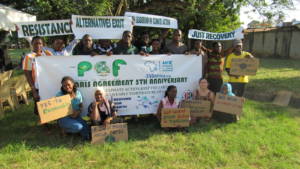
On the 19th of December, after the anniversary, Partnership for Green Future mobilized University students to ensure the youths' voice on climate change from different faiths are given space to advocate for clean energy and a future they can rely on. The main goal of the event was to bring together young people in the climate movement to mark the 5th anniversary of the Paris Agreement and call on the government to demonstrate real climate leadership to stay within 1.5 by keeping fossil fuels on the ground and not funding their infrastructure.
The event was attended by the students of University of Dar es Salaam, Climate Action Network Tanzania, Climate Science community and TAJPI. Other participants included Dar es Salaam University Student Organization (DARUSO), Association of Students from Geography and Environmental Studies (AGEM), University of Dar es Salaam Association for Wildlife and Conservation (UDAWICOSA), Earth day and Go Green.
Key moments
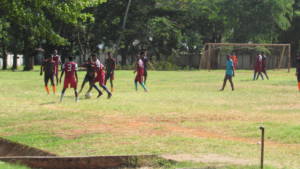
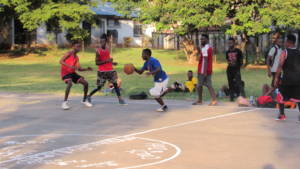
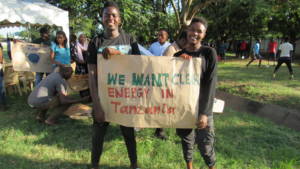
- Sports: The event started with sports, basketball and football, which took place at Mabibo Hostel grounds. Sports is considered as a good strategy of mobilization in Tanzania.
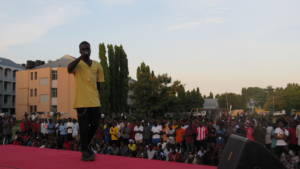
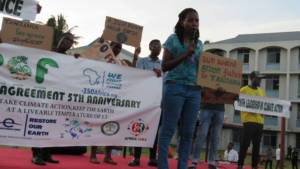
- Talent show and short messages:
After the sports, some of the students showed their talents by singing in different styles focusing on themes about tackling the effects of climate change and the role of youth in climate action. There was also a performance of various written messages that were displayed and delivered verbally.
The Main Speech: Ms. Rehema Peter, the host of the event, shared information with guests and participants on the real challenges Tanzania is facing due to climate change. "Dar es Salaam has become the hottest city in East Africa and people are still ignorant of the cause". She also raised an alarm about the development of the East Africa Crude Oil Pipeline (EACOP) which is going to put Tanzania at high risk. She called for University students and other stakeholders to use all channels to advocate for a Fossil Free Tanzania and for the Government to keep fossil fuels in the ground. There was also a special moment to share the message with all the students gathered, and to remind them that they are the voice of change. East Africa Radio from Dar es Salaam covered the event, taking the message of the day to be aired and published, and promised a platform for climate action. Different young people at University were recorded with various messages calling for clear action towards a just recovery ahead of COP 26.
The students emphasized the need to be empowered on issues related to fossil fuels and strategies so as to build a successful climate movement. "We appreciate each and everybody who made this event a success, especially the support from 350 Africa and we cannot wait to change the tide in our beloved country."
By Rehema Peter, founder of Partnership for Green Future
GIFSEP Empowers Environmental Stewards in Secondary Schools in Nigeria
“Good habits formed at youth make the difference” - Aristotle.
In recognition of this, the Global Initiative for Food Security and Ecosystem Preservation (GIFSEP) is undertaking a project targeted at building the capacity of students and teachers to address Climate Change primarily by promoting environmental stewardship through behavioural change and skills in renewable energy and waste management.
The Project whose implementation began in November 2017 targets Senior Secondary Schools in the Federal Capital Territory (FCT), Nigeria. It is being implemented under the supervision of the FCT Secondary Education Board and funded by the United Nations Development Programme's Global Environmental Facility Small Grants Programme.
Thus far, activities carried out have included training workshops and school visitations.
The project has equipped students and teachers through numerous trainings on climate change, renewable energy and waste management to address environmental challenges. Through our support, the students have been able to establish environmental clubs in their schools which now serves as the primary vehicle for taking climate action in their respective schools. The Capacity Building of Students to address climate change project, has received numerous positive commendations from the Secondary Education Board, FCT Schools management, teachers and students and more. Consequently, the project has been able to secure the commitment of teachers to raise a generation of green champions in their schools. Also, the students have pledged to the good environmental stewards.
Only recently, the GIFSEP team visited schools in FCT-Nigeria to officially establish new environmental clubs in Schools while also encouraging pre-existing environmental clubs to continue to take definite climate action. Overall, the students, teachers and the school management show great enthusiasm towards the project and have all committed to be ambassadors of the environment.

